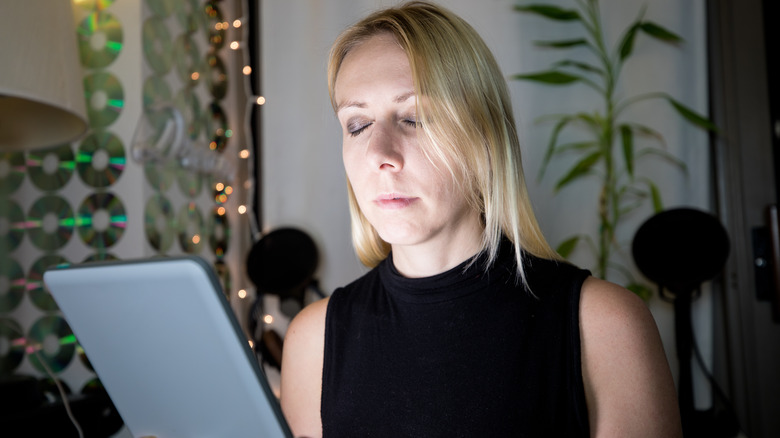Clinical Psychologist Provides 5 Expert Tips For Combatting Seasonal Affective Disorder
We may receive a commission on purchases made from links.
According to Mental Health America, 5% of the U.S. population experiences some form of seasonal affective disorder (SAD), and four out of five of those people are women. Although the symptoms of SAD are different for everyone, they generally include sleepiness, lack of interest in your usual hobbies, irritability, feelings of hopelessness, low energy levels, and an increased appetite for carbs, which can lead to weight gain (via John Hopkins Medicine).
In an exclusive, clinical psychologist and author of A Deeper Wellness: Conquering Stress, Mood, Anxiety and Traumas, Dr. Monica Vermani, tells The List that there are several ways to combat seasonal affective disorder when the days get shorter and there are more clouds than sun.
"The first step to treatment is always awareness," Dr. Vermani says. "By bringing awareness to your seasonal symptoms, you can take actionable steps to manage these symptoms in the months ahead."
Awareness comes in the form of recognizing you have SAD, which involves reflecting on "your seasonal patterns of mood, social interaction, and other symptoms and behaviors," she explains. Once you realize that you're suffering from seasonal affective disorder, it's time to take proactive steps to keep your mental health in check throughout the winter.
Take vitamin D and invest in light therapy
While nothing can replace the positive effect the sun has on our moods and our general outlook, according to Dr. Vermani, taking vitamin D supplements will "offset the lowered levels of vitamin D during the winter months." Even if you eat foods that are rich in vitamin D, it's advised that adults living in the U.S. during the winter months take between 200 IU and 2,000 IU of vitamin D per day, per The Washington Post. You can gauge what your body needs based on where you live in the country and what your diet contains in regards to vitamin D levels.
It's also worth investing in a light therapy box since it mimics the effect of sunlight. "[It's] widely considered the first-line treatment for [SAD]," Dr. Vermani tells The List. "Exposure to this artificial light source during the winter months helps keep circadian rhythms on track. Light therapy boxes are also known as phototherapy boxes ... and can help the management of seasonal affective disorder symptoms."
Unlike other forms of artificial light, these light boxes are brighter, helping to boost "overall mood and alleviate mood/anxiety symptoms that come with SAD," says Dr. Vermani.
According to the Mayo Clinic, when looking into light therapy, you want a light box that has an exposure of 10,000 lux of light and produces as little UV light as possible, so as to avoid damaging your eyes or experiencing other side effects like headaches and nausea.
Stay grounded and get outside
As is the case with depression — and SAD is a type of depression, per the NHS — it's important to take care of your body so your mind works at its healthiest capacity.
"Stay grounded with seasonal changes by maintaining healthy self-care routines, including exercise, meditation, and breathing, getting enough sleep, and maintaining a nutrient-rich healthy diet," Dr. Vermani advises.
Studies have found that sticking to a daily routine can help in the fight against depression (via PsychCentral). Although you're likely to have days where getting out of bed feels nearly impossible, it's important to get up, move around, and surround yourself with others. "Engage in fun hobbies and interests that bring you joy on a regular basis," suggests Dr. Vermani.
One of those activities should be spending time in nature in the sun with friends and family. "Find a winter sport or outdoor activity you enjoy, like skating, a walk in the park, or meeting a friend to go window shopping and lunch," the psychologist says.
Although these things can have a positive effect on your mental health, it doesn't mean that they're enough for everyone. "Psychotropic medication may be a short-term option," explains Dr. Vermani. "SSRIs or antidepressants can help sufferers overcome seasonal depression and ease symptoms that hinder day-to-day functioning and productivity."
Seasonal affective disorder is real and its symptoms shouldn't be ignored. So, if you feel down when winter rolls around, pay attention to your emotions and be proactive in identifying the source.


